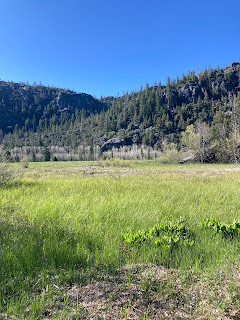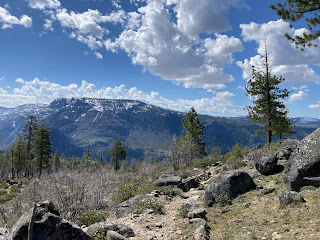"He squandered his money on a life of debauchery. When he had spent it all, that country experienced a severe famine, and now he began to feel the pinch; so he hired himself out to one of the local inhabitants who put him on his farm to feed the pigs. And he would have willingly filled himself with the husks the pigs were eating, but no one would let him have them. Then he came to his senses and said, 'How many of my father's hired men have all the food they want and more, and here am I dying of hunger! I will leave this place and go to my father and say: Father, I have sinned against heaven and against you; I no longer deserve to be called your son; treat me as one of your hired men.' So he left the place and went back to his father."
Nouwen starts his consideration of the Younger Son's return with a consideration of Rembrandt's physical presentation of the Younger Son:
"Rembrandt leaves little doubt about his condition. His head is shaven. No longer the long, curly hair which Rembrandt painted himself as the proud defiant prodigal son in the brothel. The head is that of a prisoner whose name has been replaced by a number. When a man's hair is shaved off, whether in prison or in the army, in a hazing ritual or a concentration camp, he is robbed of one of the marks of his individuality. The clothes Rembrandt gives him are underclothes, barely covering his emaciated body. The father and the tall man observing the scene wear wide read cloaks, giving them status and dignity. The kneeling son has no cloak. The yellow,-brown, torn undergarment just covers his exhausted, worn-out body from which all strength is gone. The soles of his feet tell the story of a long and humiliating journey. The left foot, slipped out of its worn sandal, is scarred. The right foot, only partially covered by a broken sandal, speaks of suffering and misery. This is a man dispossessed of everything...except for one thing, his sword. The only sign of dignity is the short sword hanging from his hips - the bade of his nobility. Even in the midst of his debasement, he had clung to the truth that he was still the son of his father. Otherwise he would have sold his valuable sword, the symbol of his sonship. The sword was there to show me that, although he came back speaking as a beggar and an outcast, he had not forgotten he was still the son of his father. It was this remembered and valued sonship that finally persuaded him to turn back."
How did it come to this?
The world, the Younger Son found out - as we all find out sooner or later in our own lives - has time for us as long as we have something to offer it: "They only noticed him as long as he could be used for their purposes. But when he had no money left to spend and no gifts left to give, he stopped existing for them" - even more so because he, as a foreigner in a foreign land, had nothing offer but the money he had - "Real loneliness comes when we have lost all sense of having things in common". It was only when he was lost - not considered even human among those whom he lived - only then, suggest Nouwen, did he truly grasp his situation: "He was truly lost, and it was the complete lostness than brought him to his sense".
"Whatever he had lost, be it his money, his friends, his reputation, his self-respect, his inner joy and peace - one or all - he still remained his father's child." And so in remembering what he was and whose he was - he is still the son of his father, for all that he did to him - he decides to return home as servant. Even in the depths of his humiliation, he has made an important discovery: "On the one hand the younger son realizes he lost the dignity of sonship, but at the same time that sense of lost dignity makes him also aware that he is indeed a son who had dignity to lose".
It is precisely at this moment, argues Nouwen, that the Younger Son has returned, even though he has not left the pigs or the foreign country. He has hit the bedrock of his being and there are no illusions left: "When he found himself desiring to be treated as one of the pigs, he realized he was not a pig, but a human being, the son of his father." And now, realizing - or really remembering - that he is the son of his father, he can hear the still, soft voice of his father calling to him. It is that knowledge of his father, and of the love that he had, that convinces him to return home even though he returns as a hired hand.
But the Younger Son must believe that there a home and father to go back to: "There are always countless events and situations that I can single out to convince myself and others that my life is just not worth living, that I am only a burden, a problem, a source of conflict, or an exploiter of other people's time and energy. Many people live with this dark, inner sense of themselves. In contrast to the prodigal, they let the darkness absorb them so completely that there is no light left to turn toward and return to. They might not kill themselves physically, but spiritually they are no longer alive. They have given up faith in their original goodness and thus also in their Father who has given them their humanity. But when God created man and woman in his own image, he saw that 'it was very good,' and despite the dark voices, no man or woman can ever change that."
And so, the Younger Son begins his journey back. As he wakes, he rehearses the speech he will give to his father:
"As I read these words (the Younger Son's speech) I am keenly aware of how full my inner life is with this kind of talk. In fact, I am seldom without some imaginary encounter in my head in which I explain myself, boast or apologize, proclaim or defend, evoke praise or pity. It seems I am perpetually involved in long dialogues with absent partners, anticipating their questions and preparing my responses. I am amazed by the emotional energy that goes into these inner ruminations and murmurings...The reason is clear. Although claiming my true identity as child of God, I still live as though the God to whom I am returning demands an explanation...Belief in total, absolute forgiveness does not come readily. My human experience tells me that forgiveness boils down to the willingness of the other to forgo revenge and to show me some measure of charity."
The Younger Son struggles to accept he has lost the dignity of a son and is a hired hand; in no way does he see his father able to offer more than that. We as well, says Nouwen, struggle with forgiveness:
"One of the greatest challenges of the spiritual life is to receive God's forgiveness. There is something in us that keeps us clinging to our sins and prevents us from letting God erase our past and offer us a completely new beginning. Sometimes it even seems as though I want to prove to God that my darkness is too great to overcome. Where God wants to restore me to the full dignity of sonship, I keep insisting that I will settle for being a hired servant. But do I truly want to be restored to the full responsibility of the son? Do I truly want to be so totally forgiven that a completely new way of living becomes possible? Do I trust myself so absolutely to God's love that a new person can emerge? Receiving forgiveness requires a total willingness to let God be God and do all the healing, restoring, and renewing. As long as I want to do even a part of that myself, I end up with partial solutions, such as becoming a hired servant. As a hired servant, I can still keep my distance, still revolt, reject, strike, run away, or complain about my pay. As the beloved son, I have to claim my full dignity and begin preparing myself to become the father."
Where to start? Nouwen suggests that just as He said that we are to come to God as children, living in a second innocence not granted by birth but made by conscious choices - and following what came to be called the Beatitudes: "How blessed are the poor, the gentle, those who mourn, those who hunger and thirst for uprightness, the merciful, the pure of heart, the peacemakers, and those who are persecuted in the cause of uprightness...The Beatitudes offer me the simplest route for the journey home, back into the house of my Father. And along this route I will route I will discover the joys of the second childhood: comfort, mercy, and an ever clearer vision of God."
Nouwen ends this section as he ended the first, that in some way the Younger Son represents what Jesus did for us:
"I am touching here the mystery that Jesus himself became the prodigal son for our sake. He left the house of his heavenly Father, came to a foreign country, gave away all he had, and returned through his cross to his Father's home. All of this he did, not as a rebellious son, but as the obedient son, sent out to bring home all the lost children of God. Jesus, who told the story to those who criticized him for associating with sinners, himself lived the long and painful journey he described....Looking again at Rembrandt's Prodigal Son, I see him now in a new way. I see him as Jesus returning to his Father and my Father, his God and my God."
We all make this journey because at some point we must. Jesus did not because He had to, but because of His great love for us. Even for a single one of us.

.png)

















